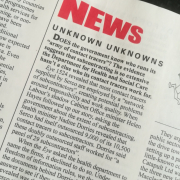Babylon’s Burning… the Story of the Failed “AI” Health App
The Sunday Times has really got into its investigations recently, and after its excellent expose of the UK’s HS2 rail programme, last week it looked at another issue with a definite “Bad Buying” angle.
Babylon Health, set up in 2013, was going to revolutionise healthcare. Ali Parsa, the founder, is a serial entrepreneur whose previous venture, Circle Holdings, also had some issues (he stepped down from Circle before he set up Babylon). Circle ran Hinchingbrooke Hospital in England, the first fully outsourced hospital. Initially, it seemed to go well, and Parsa was a highly visible cheerleader for the operation, but after a couple of years, Circle pulled out leaving the NHS to pick up the pieces.
But with Babylon, Parsa seemed to have a real product that could benefit everybody. It was an AI powered diagnostic platform that could tell you what health problem you had after a short online consultation. The “app” scored better than doctors on medical tests, Parsa claimed, and could provide excellent diagnosis and care at a fraction of the current cost. For the permanently hard up health services in the UK and US, it seemed too good to be true – and of course it was. However, Parsa used political connections to win business, as the Times reported. Between 2015 and 2022, the company had 22 meetings with government ministers.
“Babylon’s deals with the NHS, which saw it receive at least £22 million over the past three years alone and helped it to woo investors, were in part due its links with the Conservative Party and the backing of Hancock, the health secretary from 2018 to 2021. The Tories received more than £250,000 in donations from individuals and companies with stakes in Babylon Healthcare, including Hancock, whose failed Tory leadership bid in 2019 received £10,000.”
However, the newspaper’s investigation found high-pressure sales techniques and some claims for the product that were simply false. For example, at the Royal College of Physicians in 2018, Parsa showed how Babylon’s AI used a phone’s camera to analyse the facial expression of a female patient to pick up subtle cues that a doctor might miss. This is how the Times describes it.
“This is a real consultation,” Parsa said on stage. “This is what we have built. None of this is a show.”
It was a show. The facial-analysis tool, a prop for a demo, never made it to market. The “patient” in the video was an executive assistant at Babylon… This sleight of hand was a small example of a culture fixated on form over substance, a trait common in Silicon Valley but dangerous in healthcare.”
Indeed, the much vaunted AI was little more than a decision tree written in Excel based on doctors’ knowledge. Soon, sceptics began testing it and found that it could easily mistake a heart attack for a less serious panic attack, or an ingrowing toenail for gout. I remember various people on Twitter talking about how dangerous it was and calling out Babylon as a con.
But the firm managed to raise $1.2 billion from investors between 2013 and a stock market float in 2021, and at one point Babylon was valued at some $4.2 billion. But after that float, some badly judged deals started affecting the firm’s finances, just as more expert voices also pointed out the technical failings. For instance, the Royal Wolverhampton NHS Trust signed a ten-year deal for a digital-first GP service that would allow patients to use Babylon’s digital tools. But Babylon cancelled the contract in 2022, saying it just could not afford to invest in the service.
Finally in August this year, the firm collapsed into administration and the remnants were picked up by a couple of trade buyers. Parsa has pretty much disappeared, as has most of his own fortune.
It all reminds me a little of the Theranos scandal – the fake blood testing equipment launched by Elizbeth Holmes (who is now in a US jail). Babylon was not as fake as that, and Parsa is not accused of wrongdoing, but the principal of something that everyone wanted to work, but really was built on sand, is the same. And there is also FOMO – the “fear of missing out”. This is an extract from the Bad Buying book section on Theranos.
“Buying failure come into this because retailer Walgreen’s spent $140 million with Theranos over seven years, hosting around 40 blood-testing centres in their stores. They got very little benefit from that and recovered some $30 million after a lawsuit and settlement following the eventual disclosure of the issues. Amazingly, as Bad Blood reports, Walgreens’s own laboratory consultant, Kevin Hunter, had seen early on that something wasn’t right with Theranos. But the executive in charge of the programme at Walgreen’s said that the firm should pursue the pilot because of the risk that CVS, their big competitor, would beat them to a Theranos deal.
Again, buyers wanted to believe that something was real, even in the face of mounting evidence that it wasn’t. This relates back to comments around believing the supplier … it is easy for a naïve or gullible buyer to be sucked into believing what the supplier wants them to believe.
Suppliers will take advantage of this tendency – whether it is the relatively innocent “yes, we can install this new IT system in six months” or the more dangerous “this equipment will find hidden bombs”. And FOMO – the fear of missing out to the competition – is something else suppliers will use, and that can lead to bad decisions. It’s not just physical goods either. The top consulting firm selling its latest “strategy toolkit” will mention that the potential client’s biggest rival is also very interested”.
One day, there is little doubt that a real AI-powered system will be really useful in the world of medical diagnoses. So maybe Parsa was just ahead of his time? But that is two of his “innovative” businesses that have cost health services time and money without much benefit in return. So I’d be very careful next time he announces he has a great idea…









Leave a Reply
Want to join the discussion?Feel free to contribute!